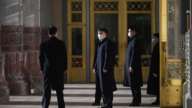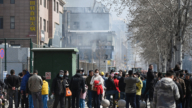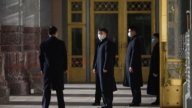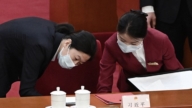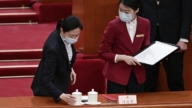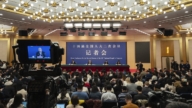【新唐人2013年03月18日讯】16号,中共全国人大通过多项人事任命,新任国务院总理李克强的人事班底终于出台。外界分析,相比10年前胡锦涛、温家宝处处受制于江泽民派系,习近平、李克强现在所处的人事环境要有利得多。但面对日益严峻的执政危机,习近平、李克强能否突破中共体制束缚和利益集团的阻碍,前景并不乐观。
根据中共全国人大十二届一次会议16号通过的决议,张高丽、刘延东、汪洋、马凯被任命为新一届国务院副总理,中央书记处书记杨晶、国防部长常万全、原外交部长杨洁篪、公安部长郭声琨、国资委主任王勇当选国务委员。至此,中共10年一次的权力大换届基本完成,习近平、李克强的执政班底正式出台。
原大陆史学教授刘因全:“我认为,比江泽民时期和江泽民影响下产生的班子要好一些。这也说明江派势力在衰退。”
外界分析,根据排名,政治局常委张高丽将担任常务副总理,主管金融。前国务委员刘延东主管科技、教育。汪洋主管工业及对外经贸。原国务院发改委主任马凯则主管农业、林业等。
这其中,刘延东被认为是团派人物,受到胡锦涛、温家宝信任,马凯则是温家宝的手下干将。而团派大将、原广东省委书记汪洋,一直被视为“改革派”的代表人物。这次汪洋成为排名第三的国务院副总理,主管国家发改委、国土资源部、住房建设部、商务部等,角色明显吃重。汪洋还将接替王歧山,成为中美战略经济对话的中方代表,并负责与欧盟等进行经贸对话。
原大陆史学教授刘因全分析指出,当年,胡锦涛、温家宝因为受到江泽民安插人马的干扰,导致“政令不出中南海”。相比之下,胡、温通过“裸退”,把权力完全交给习近平、李克强,因此习、李目前的执政条件要比胡、温当初好一些。但因为江派一些人马还在、江泽民造成的贪腐作风还很盛行、再加上政法委这一烂摊子还在运作,因此习、李执政任务艰钜。
《德国之声》中文网援引《南德意志报》的文章指出,大陆新总理李克强面临的经济挑战相当艰钜。而处事低调谨慎的李克强如果要改善经济,必须先学会得罪人。
刘因全:“如果李克强不想得罪人的话,是改善不了中国的状况的。因为中国起码有这么一批人需要得罪,就是既得利益集团的一些人。这些人已经形成了一个庞大的既得利益集团,他们抱成团,抵制改革。”
刘因全指出,习近平、李克强等人也意识到中共面临的危机,并试图解决这些问题。但他们会遇到两大阻力,一个是官员腐败,一个是江泽民“血债派”继续坚持对法轮功学员和维权异议人士的迫害。因此,习、李的“改革”很难收到大的成效。
刘因全:“他们都不敢触动这个体制,不敢触动江泽民留下烂摊子的症结。只是在小的方面、在笼子里进行一些修修补补的改革、改变。”
北京时政观察人士华颇也向《新唐人》表示,习、李和中共既得利益集团将会有一番生死斗,但习近平不会放弃一党专制。
北京时政观察人士华颇:“他还要有‘四个坚持’,其他方面可能会有些开放的动作,但是不要指望他会实行民主、宪政。”
《德国之声》的报导还指出,独揽党、政、军大权的习近平,将主导中国未来十年的走向。但在中共的体制结构之中,习近平的行动空间有限。
采访/刘惠 编辑/李谦 后制/周天
CCP Leadership Team Under Li Keqiang Revealed
On March 16, the National People’s Congress
(NPC) of the Chinese Communist Party(CCP)
approved the appointment of the leadership team.
This new team is under the new Premier Li Keqiang.
Analysts say that Xi Jinping and Li Keqiang face a better
situation than Hu Jintao and Wen Jiabao 10 years ago.
However, in facing a growing ruling crisis, will Xi and Li
be able to break from the shackles of the CCP system?
Can they break the barriers
from the vested interest groups?
The outlook does not look promising.
On March 16, the NPC first session passed a resolution.
Zhang Gaoli, Liu Yandong, Wang Yang and Ma Kai
were nominated as new Vice Premiers of the CCP regime.
The new state councilors are CCP Secretariat
Yang Jing, Defense Minister Chang Wanquan,
and ex-Foreign Minister Yang Jiechi.
They are also joined by CCP top cop Guo Shengkun,
as well as Wang Yong, director of State-owned
Assets Supervision & Admin Commission.
Now the regime has basically completed
its once-in-a-decade power transition.
Liu Yinquan, former Professor of History: “I think
the new leadership team is better than the one
generated under the Jiang Zemin administration.
Also, it shows that the Jiang’s faction has waned.”
According to rankings, analysts speculated that Zhang Gaoli
may serve as Deputy Premier, placed in charge of finance.
Liu Yandong may control science, technology and education.
Wang Yang may take charge of industry and foreign trade.
Ma Kai may be in charge of agriculture and forestry.
Liu Yandong, with experience in the Communist Youth
League, has been trusted by Hu Jintao and Wen Jiabao.
Ma Kai was a go-getter under Wen Jiabao.
Wang Yang, a core member of the Youth League
and former Party chief of Guangdong, is
considered a major figure of CCP reformist forces.
Wang Yang is expected to take an important role that
leads National Development & Reform Commission,
Land & Resources Ministry, Ministry of Housing &
Urban-Rural Development and the Commerce Ministry.
Also, Wang will replace Wang Qishan as Chinese
representative in China-U.S. Strategic Economic Dialogues.
He will also take this role in the economic
dialogues with the EU, and with other nations.
Liu Yinquan remarks that in the past, Hu and
Wen were perturbed by Jiang Zemin’s fraction.
This lead to officials’ defying
central orders and prohibitions.
Now, authority has been fully transferred to Xi Jinping
and Li Keqiang, who face a better situation than Hu-Wen.
Liu points out that Jiang’s faction still
exists, as does rampant corruption.
The Political & Legislative Affairs sector is still functioning.
Therefore, both Xi and Li are facing arduous challenges.
Chinese version website of Deutsche Welle
quoted an article in the Süddeutsche Zeitung.
It said that the new Premier Li Keqiang
faces quite daunting economic challenges.
The article argued that Li, who is low-key and
prudent, must first learn how to offend people.
This is if he wants to improve the economy.
Liu Yinquan: “Li Keqiang couldn’t improve
China’s situation without upsetting people.
Groups with vested interests are
those who have to be offended.
They stick together in a huge vested
interests group, in order to resist reforms.”
Liu Yinquan says that Xi, Li and some other
top officials have realized the CCP’s crisis.
They want to crack these problems,
but encounter two major resistances.
The first is official corruption.
The second is the continuation of the persecution of
Falun Gong practitioners, religious minorities, and dissidents.
This was enacted by the blood-debt faction,
under the leadership of Jiang Zemin.
Liu expects that the Xi-Li “reform” will
hardly be able to get favorable results.
Liu Yinquan: “They both dare not touch the CCP system,
and neither dare touch the crux of the mess left by Jiang.
They’re just tinkering in some minor
aspects, and are still within the system.”
Hua Po, political observer in Beijing, comments.
Xi-Li will engage in a life and death struggle
with the CCP vested interest groups.
But Xi Jinping won’t give up the
one-party dictatorship, he says.
Hua Po: “He has advocated “Four Adherences”.
He may relax the control in some other areas, but don’t
expect him to practice democracy and constitutionalism.”
Deutsche Welle reported that Xi Jinping, top
chief of the Party, the regime and military,
will dominate China during the next decade.
However, being a member within the CCP system,
Xi Jinping’s space to act is limited, said the news report.



